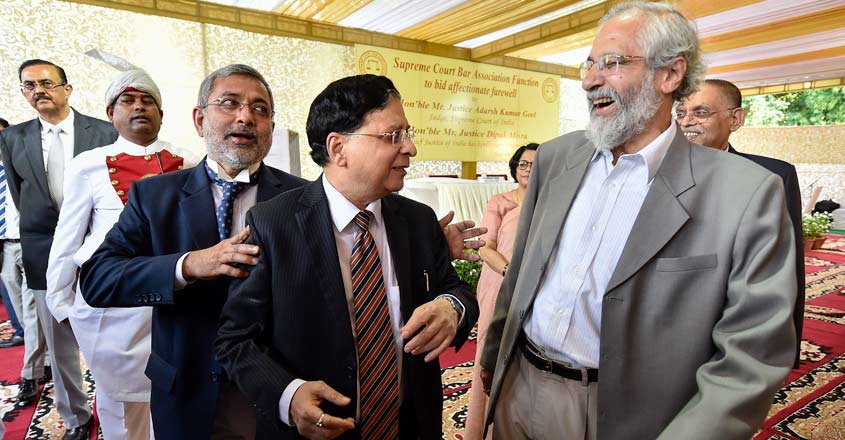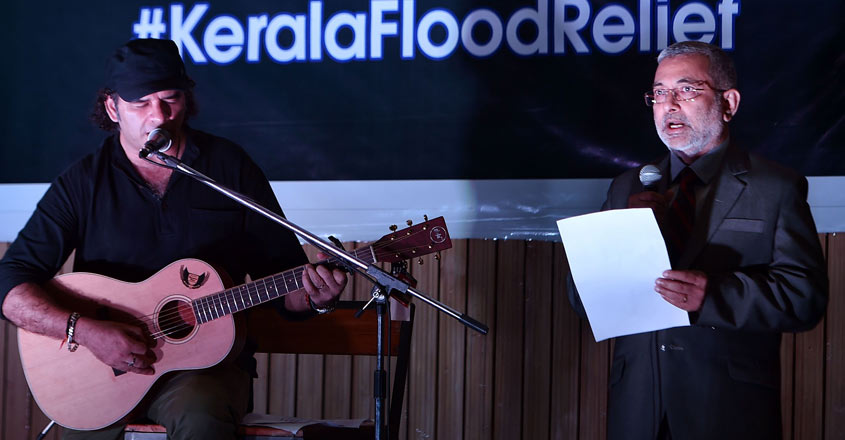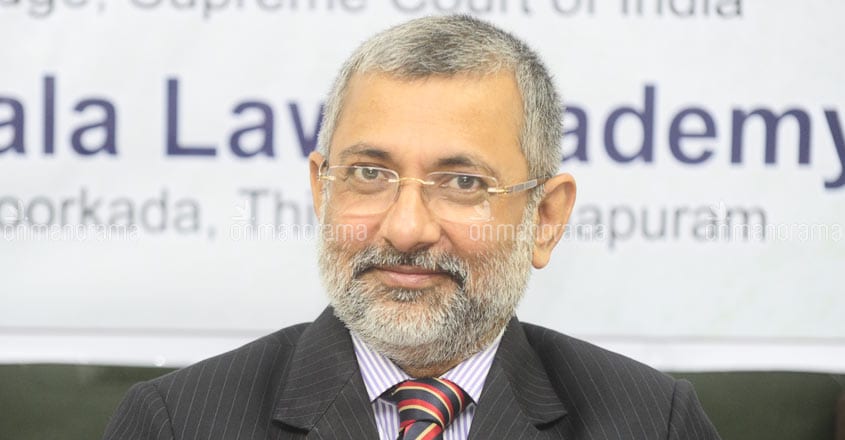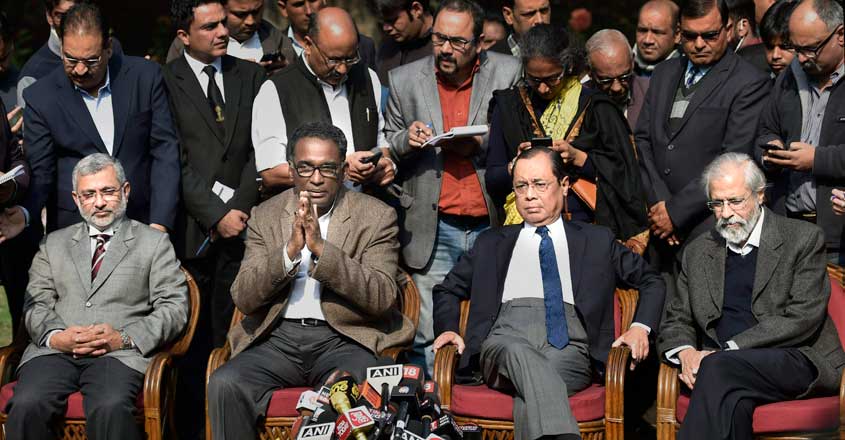Courts should not tell how to conduct temple rituals, says retired SC judge

Mail This Article
There is no duality in the life of former Supreme Court Judge Kurian Joseph who retired on Thursday. He stated judges can keep away their political beliefs at bay while delivering a verdict. At the same, he noted, “Every judge should be able to think beyond the legal system."
“Taking oath as judge, I had resolved to carry out my duties without fear or favour. The oath was taken in the name of God and I am confident that I was 100 % sincere in my job. My conscience is clear and with divine grace, I could complete my tasks honestly and fairly,” Joseph said.
“All these years, I was also searching whether a higher power of justice existed above the legal system. The biggest challenge faced by a judge is to identify that higher justice. I believe that I have secured a victory in that challenge,” he added.
“While seeking and delivering justice, no technical issue proved to be a hurdle for me. A face that cries for justice appeared in my mind every time I took up a case. Nothing else, including the skill of the lawyer or the observations of the lower courts, affected me,” said the former judge who was born to Manikkath Joseph and Annakkutty of Thannippuzha house in Kalady, Kerala, in 1953.
In an interview with Manorama, the retired judge speaks in detail about his life, career and opinions on diverse matters.

Q: A person fighting for justice often has to pay a big price, especially with regard to hiring the best lawyers.
A: I have discussed this matter with many lawyers, asking them what made officials corrupt. It is a reality that the fight for justice involves spending large amounts of money. Many people realise that even a life’s savings are not enough to take a legal battle up to the Supreme Court. So, whenever the government or an employer approached the court, I have never summoned the defendant, unless a grave legal issue was involved. Nor have I sent a notice. This is because I am well aware of the cost and consequences an official would suffer while fighting a case in Supreme Court. The impact of the case on the official would also naturally affect society.
Q: The Supreme Court is beyond the reach of the common man. Alternatives like Legal Service Authority have had almost no impact.
A: This is a reality that one cannot deny. But I always tried to find a solution to this issue. In some cases that I took up, when the senior advocates sought time to appear before the court, I asked them to assign juniors and ended the legal procedures quickly. I felt that this would benefit the common man. No senior has expressed displeasure over the matter.
The Legal Service Authority provides support to poor litigants. In many cases, I have appointed senior lawyers as amicus curiae and they have gladly accepted the honour.
While serving in Kerala and Himachal Pradesh and in the Supreme Court, I appointed 24 lawyers as mediators. In 90% of the cases, this led to the closure of the litigation. This is a mediation conducted under the aegis of the court. A large number of other lawyers also served as mediators.
Q: You were considered more of a mediator rather than a judge, especially in domestic and marital cases.
A: The aim of the family courts is neither to simply pronounce a judgment or consider a legal issue, but settle cases according to the law. A marriage needs to be preserved as an institution and solutions found for marital disputes. No major legal issue would be involved in family or property disputes. If mediation is successful in such cases, it would lead to peace in the family as well as in the land. The legal procedure also can be closed. In this way, I have been able to end the legal process in cases which lasted three generations and led to 3-4 murders. Many intellectual property and commercial cases were similarly closed.
Q: Could you reveal the value system that inspires you to take such decisions?
A: Every judge has to develop a sixth sense. The judge has to decide whether a legal matter has to be resolved in the case under consideration or settle matters between the litigants. It is the sixth sense of the judge that can see the fine difference.
Even in the Supreme Court, more than 50% of the cases do not involve serious legal issues and can be closed through mediation or suggesting a compromise formula. Not only family disputes but also legal fights between big companies can be ended this way.

Q: Could you speak on some of your notable judgments, especially as part of the Constitution Bench?
A: All the cases were important to me, including the judgment on the service matter of a class 4 employee and disputes involving crores of rupees. On the Constitution Bench, my latest judgment on capital punishment and several others in which I took a divergent stand gave me total satisfaction.
Q: A notable judgment where a divergent order was pronounced was that involving Yakub Memon in the Mumbai blasts case. The Court met at midnight to overturn your decision. The way the Court acted was shocking.
A: The entire world was shocked over the development. The court, which has to make an effort to save lives, spent more time to end a life. This disturbed many people. I too was affected. A person who was served a death penalty had a right to move a review petition under Article 137 of the Constitution. This right was blocked in this case. That was sad.
Q: Could you elaborate?
A: The Supreme Court is among the major judiciaries in the world that strive to save lives. It has always upheld Article 21 of the Constitution. But that the same court sat for extra hours to end a person’s life was really disturbing.
Q: Have other judges also been similarly disturbed?
A: After a case is closed, judges do not discuss the judicial matter. There is no precedent in this regard. It is for the society to debate on a judgment.
Q: You have ordered that when a judge recuses from a case, he or she should explain the reason on record. But many judges do not follow this order.
A: The judgment itself says that in some instances, it may not be possible to reveal the reason. This is the discretion of each judge. Revealing the reason shows how transparent the judge is. In some cases, revealing the reason may harm someone. However, I have always explained on record why I had recused from a case.
Q: There is an argument that a judge has to hear every case impartially and that the act of recusing gives the impression that he could be influenced.
A: Our judicial system stresses on not only delivering justice but also on the fact that it should be seen as delivered. Suppose I hear a case involving a litigant who was earlier my client. Even if a fair, honest and legally proper judgment is pronounced, the opposing party may not be satisfied. This is the main reason for recusing myself. It is part of being fair.
However, it is inexcusable if a judge recuses fearing the consequences or to spare himself from the trouble of handling a difficult case.

Speaking about fairness, there was a plea before the Supreme Court last year indirectly raising charges against the then Chief Justice Deepak Mishra. The Chief Justice himself decided which bench had to hear it. Moreover, Mishra himself attended the hearing at one point.
People holding high positions need to introspect and engage in self-criticism on such matters. Though in principle such a stand can be taken, the development damaged the trust people had in the apex court and led to a public debate.
I believe that such a public debate would force the person concerned to exercise caution on such matters. It is my belief that the drawbacks of the judicial system need to be discussed by the public. Only then can such errors be avoided in future and corrective steps taken.
Q: You are among the four rebel judges who addressed a press conference in January attacking the Chief Justice.
A: ‘Rebellion’ is a wrong word to describe our action. A serious anomaly in the delivery of justice had to be brought before the public. We four judges realised that it was time for the society to wake up on the matter.
Q: The judges, who are supposed to ensure justice, themselves were approaching the society with a complaint. Any regrets?
A: I believe that the decision to hold the press meet was 100% correct. The actions of the four judges before going public cannot be shared with the society. The guard dog bites only if its bark does not wake up the owner. Ours was a desperate action, a last resort. We fought a battle from within.
Q: You faced much criticism over the issue. The President could have been approached.
A: This is only a proposal. The President cannot intervene in matters of the Supreme Court.
Q: But in this special case…
A: After the judges have been appointed, the President can do nothing about delivery of justice. All we did was meeting the public without approaching the President. Others meet the press after submitting a memorandum to the President.
Q: You created a precedent of violating the rules for discipline but got away with it.
A: We did not engage in indiscipline. Our act was meant not for personal gain but for the good of the judicial system. In fact, we later realised that our decision prevented the judicial system from slipping into indiscipline.
Q: Did your action serve the intended purpose?
A: We cannot claim 100% success, but the subsequent actions of the Chief Justice showed that he had carried out corrective measures.
Q: You later held meetings with the Chief Justice but they were not fruitful.
A: My opinion is that some changes have to be brought to the judicial system itself. The issue did not involve the personal matters of the then Chief Justice alone. The Supreme Court should never function based on the personal opinions of the Chief Justice. Systematic mechanisms need to be put in place to carry out justice. I am sad that we could not implement it.
Q: Your stand was later corrected by the court in the master of roster matter.
A: But now there is more transparency, especially regarding case allotment and subject allocation. I wanted clear guidelines on them. The master of roster is a person who is guided by a system. I wanted a permanent body of chief justices for that.
Q: There was a move to conduct a trial of the Chief Justice.
A: I cannot comment on that as it did not concern me.
Q: You had also complained against another Chief Justice, H L Dattu, to the Prime Minister and the Chief Justice. It was over the move to make Good Friday and Easter working days.
A: It was the courage of a prophet. I considered the move of the Chief Justice as an attack on secularism.
Q: Are we living in such times?
A: I foresaw such a situation at that time, which prompted me to write the letter. But I do not want to comment on the present state of the country.
Q: Your judgment in the Muthalaq case was based on the Holy Koran.
A: The Holy Koran is a law and the judgment was indeed based on it. I interpreted shariyat, the Muslim’s personal law.
Q: Many people feel that judgments have to be practical. Some of the recent orders of the apex court have given rise to such an argument.
A: Courts only interpret the law. It is for those who enact the legislation to consider whether it can be implemented. They should create laws which are practical.
Q: The judgments regarding religious matters by interpreting the Constitution have attracted most criticism.
A: It is wrong for the courts to take a stand that those who enacted a law were unaware of public good. People tasked with creating laws are capable of deciding what is beneficial to the people and the courts need to accept this fact.
Q: It is not the court that should interpret the Constitution?
A: Courts can only examine whether a law is constitutional or not. It is for those who enact the law to check whether it is keeping with the spirit of the Constitution. The general public has to examine the matter.
Q: The courts stress on equality, respect and freedom.
A: All these factors are known to the legislators who enact laws. They also learn the law before creating new rules. The court only has to check whether these laws are constitutional, especially regarding fundamental rights.
Q: Religious strictures and constitutional tenets on issues like equality, respect and individual freedom often do not match.

A: Certain safety measures have been included in the Constitution, Article 25 for instance. It only says that public good and morality should be ensured. But morality is a very important issue. No religion preaches morally wrong things. In fact, all religious support morally correct values. There is no need for a conflict between the values of a religion and the spirit of the Constitution. Such matters have to be left to the religions. The courts ordering how to conduct rituals in a temple, pray at a mosque and that kneeling in church violates the body posture is against the spirit of the Constitution. On such matters, the religions can decide and such freedom has been given to them by the Constitution. Courts should not intervene citing the Constitution or equality or somebody’s honour. In fact, it is constitutionally wrong to do so.
Q: This is regarding another intervention. You also wrote to the Chief Justice that government intervention in appointment of judges would sound the death knell of democracy.
A: According to the existing law, the appointment of judges is the prerogative of the Supreme Court. When it has freedom to act on this matter, I felt that any sort of intervention or move to take away this freedom needs to be objected to. I also protested against the tendency to pick favourite judges or bypass seniority.
Q: A victim of this tendency is Justice K M Joseph. Will the situation change?
A: A change will take place if the Chief Justice of the Supreme Court stands firm. He should do that.
Q: How far is that possible considering the political influence in the posting of judges?
A: The Chief Justice has to take a firm stand for the sake of the Constitution and the nation’s future. If a judge cannot do that, he should not accept the post of the Chief Justice.
Q: You were earlier an active political worker, being part of the Kerala Congress. How far can a judge keep his political beliefs at bay?
A: A judge who was a politician and dealt directly with the people has an exposure that a judge who has no such experience lacks. The problems faced by people could then be understood in the context of the Constitution.
I have never felt that any judge acted based on the opinions of the political party or ideology he followed earlier. They all came to the post after rising beyond such factors.
After 1991, I no longer was a Kerala Congress activist. In 1994, I became the Additional Advocate General. Since then, there never has been any political thought or activity. Though I do not consider it to be a wrong tendency, I never did that.
I also have no intention to be a politician again after retirement. It is for the nation, not politics, that I wish to dedicate my life from now on.
Q: But that decision can be changed?
A: A person’s opinion or approach can change any time.
Q: Advocates, who have faced a bench comprising you, often commented that they were arguing before a priest. This was an apt description for a person who abandoned life in a seminary and became part of the judiciary.
This reflects the respect people have for priesthood. They believe that a priest can complete a task perfectly.
I left the seminary because I realised that I had no call from God. Only if that call exists can you lead the life of a priest. There were some indications that I was not fit to be priest and the authorities took a suitable decision. I later recognised that their decision was correct.
Q: But, in a way, you could rather carry out priestly duties in court!
A: I am humbled by the advocates’ description of me as a priest.
Q: Film actress Sarada recently hailed your physical appearance and smile. But what was the best praise you received during a long 18 years and eight-and-a-half months’ career as judge?
A: I was termed as a judge who could empathise with the common man whereve I worked as judge, be it in the high courts of Kerala or Himachal Pradesh and the Supreme Court. It gladdened my heart. This is because I believe that the best quality of a just person is his ability to understand the pain of an ordinary person.
Q: You are among the top 10 judges of the Supreme Court who have written the most number of elaborate judgments. During the last six years, you have also never missed any public function when the court is not in session.
A: Though I have taken part in numerous public events, that never affected my duties as judge. I could find time for all that by not watching films or visiting clubs. Neither do I watch entertainment or news channels on television. I worked hard all the time. My day starts at 3 am and lasts up to 10-10.30 pm. All the judgments are part of this strenuous effort. But I never compromised on quality.
Q: Justice Kurian Joseph and Kurian Joseph the man is one and the same person. You have only one face.
A: There is absolutely no difference between the two. I have tried to keep it that way always. So I feel contended on my retirement. I also thank all members of my family, friends and teachers for their support in this regard.
Q: Your plans?
A: I will continue in Delhi in the legal profession, in the arbitration sector. Mediated arbitration is my dream. I have no plans to accept any government post.
Q: Why are you reluctant to take up an official post?
A: I feel that I can do more as an arbitrator than by holding a government position. Another reason is that under the present circumstances, the government itself considers offering such posts as a freebie. I don’t want that.
(Justice Kurian Joseph was busy on his last day as judge too. The interview, which began from his residence at Motilal Nehru Marg in Delhi ended in front of the Sacred Heart cathedral. Kurian Joseph never missed a visit to the church even when he had a tight schedule. He felt that it gave him strength in his pursuit of justice.
Friends, colleagues and office staff term Justice Kurian Joseph as a person with a good heart. But the judge was only a part of that good person. No wonder there is no conflict between the man and the judge.)

